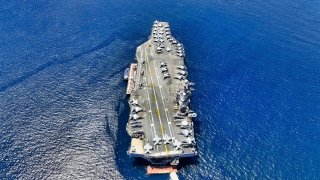China’s New Military Leaders Have Big Plans for the Indo-Pacific
Looking ahead, Xi Jinping will continue to strengthen his power base in the PLA by personally reviewing senior military leadership appointments and boosting his anti-corruption campaign.
Last December, the Standing Committee of the 14th National People’s Congress (NPC) appointed Dong Jun, former commander of the People’s Liberation Army Navy (PLAN), as China’s new defense minister more than two months after his predecessor was dismissed. The NPC also announced the disqualification of nine senior PLA officers. Prior to this, two leaders of the Rocket Force (RF) had been replaced in a surprise shake-up, and Strategic Support Force (SSF) leaders were under investigation. Such big shuffles in the PLA highlight the direction in which Xi Jinping is taking his military reform and the problems he still faces.
It’s significant that Dong Jun is the first navy chief to become China’s defense minister and to oversee the military and indicates Xi’s intention to foster trust with neighboring countries with whom China is increasingly in conflict over maritime interests. Dong has wide regional experience, having served in the eastern, southern, and northern military regions and as deputy chief of staff of PLAN. His appointment may be intended to boost the accelerated negotiations between China and ASEAN on the Code of Conduct in the South China Sea which are reaching a critical stage. Dong has also directed joint exercises with the Russian military and has a close relationship with it, according to an expert in Taiwan.
However, this doesn’t mean that China’s maritime posture has become moderate. The defense minister has little discretionary power within Xi’s administration, which is pushing a hard line on maritime issues as a core interest.
Dong Jun’s appointment may also reflect Xi Jinping’s plans to restructure military relations with the US. Dong’s predecessor, Li Shangfu, couldn’t sit in on US-China defense talks because he had been sanctioned by the US during his time as director of the equipment development department. Earlier this month, US-China defense talks resumed and Dong will likely take an active role in maritime discussions. These renewed US-China defence talks won’t necessarily ease confrontation, but may at least help prevent accidental escalation.
Another noteworthy appointment is Dong Jun’s successor as navy commander, which points to a focus on underwater capabilities. Hu Zhongming has extensive experience as a submarine specialist. Last August, media reported on an accident involving a Chinese submarine, although China denied that it had occurred. Hu’s appointment as the top naval commander a few months later makes it clear that Xi’s administration wants to enhance its underwater operational capabilities.
China’s focus on submarines is in line with its Taiwan planning. In a conflict over Taiwan, the PLAN would be expected to blockade the island to counter foreign assistance expected to arrive from the east. To do this, it must deploy aircraft carrier fleets in the western Pacific and simultaneously ensure that its submarines dominate their Taiwanese counterparts which would be supported by forces from the US and Japan. Taiwan recently launched a domestically produced submarine.
Xi will also be hoping that these appointments can help address deep-rooted corruption in the military, which remains endemic despite more than a decade of anti-corruption campaigns. Earlier efforts to address this have included placing the secretary of the Discipline Inspection Commission into the Central Military Commission (CMC) in 2017 after two former CMC vice-chairmen were exposed for corruption. In the same vein, China’s military-civilian fusion (MCF) strategy seems to have failed to improve transparency in the PLA with the government yet to pass key legislation such as a conclusive law on MCF despite this being on the agenda since 2018.
Recent events hint at the extent of corruption. Last year’s Political Consultative Conference stripped the representation of three state-owned company executives who provide equipment and technology related to space and missiles. In addition, Ju Qiansheng, commander of the SSF, and Shang Hong, commander of the Space Systems Department of the SSF, are reportedly under investigation. It’s ironic that many senior officials are being investigated in the Rocket Force and the SSF as both organizations were established as a key part of Xi’s military reforms.
Looking ahead, Xi Jinping will continue to strengthen his power base in the PLA by personally reviewing senior military leadership appointments and boosting his anti-corruption campaign. Xi’s tight control over the military will continue to stoke a power struggle among military cadres scrambling to gain his trust, which could jeopardize the effectiveness of his reforms.
Masaaki Yatsuzuka is a senior fellow at Japan’s National Institute for Defense Studies.
This article was first published by The Australian Strategic Policy Institute.

